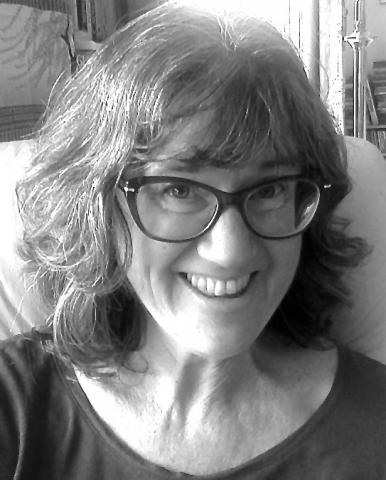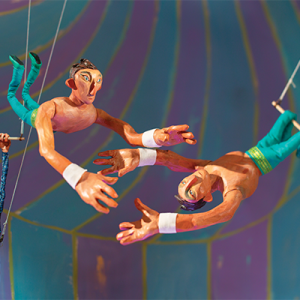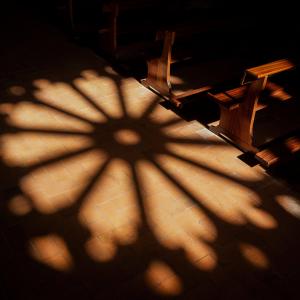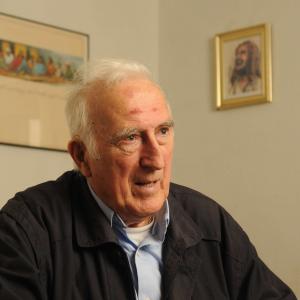
Dr. Carolyn Whitney-Brown’s most recent book is Flying, Falling, Catching: An Unlikely Story of Finding Freedom, co-authored with Henri Nouwen (HarperOne 2022). For more about her work, visit writersunion.ca/member/carolyn-whitney-brown.
Posts By This Author
Why Henri Nouwen Fell in Love With the Trapeze
Daring to have spiritual lives that swing toward freewheeling motion, community inclusion, and humor.
THIS SPRING, MY family and I were discussing what artistic representations of Jesus’ life have shaped our spiritual lives. For one son-in-law, it was Mel Gibson’s The Passion of the Christ, though he noted it is quite violent. For my husband and our adult kids, it was Jesus Christ Superstar. For me, it was seeing “Godspell” in Toronto in 1972 when I was 12. I vividly remember the wide-open energy that kept inviting new disciples into the group of Jesus’ followers, the circus-like performers bursting with enthusiasm, encouraging each other to creatively express what they were discovering together. It was physical, passionate, musical, hilarious. I looked up the musical’s history and discovered that my spirituality was shaped by legends of improv comedy, including Gilda Radner and Martin Short, who went on to be cast members of Saturday Night Live, and Eugene Levy, whose storied career continued this century in Schitt’s Creek.
Perhaps that early spiritual orientation toward freewheeling motion, fun, community inclusion, live performance, and humor is why I appreciate theologian and author Henri Nouwen’s efforts to image our spiritual lives as daring, interdependent trapeze acts.
It's Tempting — But Dangerous — To Protect Faith Leaders We Admire
In November 2018, an academic acquaintance in Canada phoned me with a dilemma. She had just heard about the 2015 canonical investigation by authorities in the Roman Catholic Church that concluded that Jean Vanier’s mentor, Thomas Philippe, had sexually abused women who came to him for spiritual direction, both before and during his years at L’Arche in France. This was a big problem: She was in the early stages of planning an invitation-only academic symposium about Vanier and his legacy. Should she go ahead?
Jean Vanier: Remembering an Icon, Not an Idol
Reading the flood of obituaries and tributes to Jean over the past weeks, I have been struck by this insight: Jean’s central message about transforming structures of privilege to build community across every imaginable kind of difference makes sense without reference to Jesus — but his life doesn’t. His deepest desires and choices were all tied to his reading of the gospel stories of Jesus and his community.
Safe in God’s Heart
The gift and struggle of Henri Nouwen’s life.
FELLOW PSYCHOLOGY STUDENTS in Nijmegen in 1957 thought initially that newly ordained Henri Nouwen wanted to cultivate important people. “We misunderstood,” recalls one. “Henri was genuinely interested in people. We didn’t notice that he was as interested in the janitor or groundskeeper as he was in the important people we were watching.”
Nearly 40 years later, this was still recognizably Henri Nouwen: eager to cultivate people of all lands, to really know them, to help them take root and grow, to nurture and nourish anyone he met.
HENRI FIRST CAME to the United States as a ship’s chaplain in his 20s, and gradually became a well-known spiritual author, teacher, and speaker. He was a hugely popular professor at Notre Dame, Yale, and Harvard, traveling widely, his influence extending to people of many faiths. He was never a cloistered academic.
Even so, it was remarkably courageous 10 years ago when Henri moved to L’Arche Daybreak in Richmond Hill, Ontario. Many members of L’Arche do not read, so Henri was choosing to live where his reputation meant nothing. His restless soul longed for a home where people would be less interested in his credentials than in who he was.
He found it: Everyone at Daybreak was interested in a 55-year-old priest of such brilliance who seemed unable to make a sandwich; who totaled a new car driving it away from the dealership; who spoke with his giant hands flailing and his whole gangly body quivering with his desire to communicate; whose Dutch accent could offer a whole meditation on “face” and only halfway in would we catch on that he was speaking of faith ; who might in a single week be giving talks on three continents; whose friends came hitch-hiking and in private planes; who loved to dance with the community’s children at liturgies; who willingly shared in his 30-some books details of his inner life that most of us would cringe to admit, much less publish! Daybreak met a deep need in the heart of someone very gifted and very broken, wonderful in his capacity for friendship and insatiable in his need for friendship.
Just as Daybreak loved Henri, he grew to love Daybreak. He developed a deep friendship with Adam Arnett (1961-1996), a man who never spoke a word. Henri describes that relationship in his forthcoming book, Adam (Orbis Books). Henri continued to accept speaking engagements, but rarely traveled without members of the community to speak with him. “People won’t remember a word I said,” he reflected, “but they’ll remember that Bill Van Buren and I stood here as friends and equals and spoke together.”
Once an audience of several thousand people was hanging silently on to his every word. As he reached the climax of his insights, Bill leaned over and spoke into the microphone: “I’ve heard that before.” It totally exploded the suspense. Henri loved to tell that story.



